Researchers identify important gene in fight against prostate cancer
Sist anmeldt: 14.06.2024

Alt iLive-innhold blir gjennomgått med medisin eller faktisk kontrollert for å sikre så mye faktuell nøyaktighet som mulig.
Vi har strenge retningslinjer for innkjøp og kun kobling til anerkjente medieområder, akademiske forskningsinstitusjoner og, når det er mulig, medisinsk peer-evaluerte studier. Merk at tallene i parenteser ([1], [2], etc.) er klikkbare koblinger til disse studiene.
Hvis du føler at noe av innholdet vårt er unøyaktig, utdatert eller ellers tvilsomt, velg det og trykk Ctrl + Enter.

Learning that cancer has spread is always bad news. A study from Aarhus University has identified a gene that determines whether patients with prostate cancer develop metastases to other parts of the body.
"We have identified the KMT2C gene, which is very important for the spread of prostate cancer. Loss of the KMT2C gene increases the risk of developing metastases. This may be relevant both for patients at risk and for understanding the disease," says Associate Professor Martin K. Thomsen from the Department of Biomedicine.
Prostate cancer is the second most common cancer in Denmark and its incidence is constantly increasing. The disease progresses slowly, but metastatic prostate cancer is difficult to treat and has high mortality rates.

Formation of an aggressive primary tumor due to the loss of five tumor suppressor genes. Source: Nature Communications (2024). DOI: 10.1038/s41467-024-46370-0
"This gene is a 'signal gun' for the development of the disease, and it may become the basis for screening patients in the future. If the gene is mutated, then the patient is at risk of developing metastases. In the long term, we can use this sign for surgery or careful observation of a group of patients," says the researcher.
The results of this study follow two recent studies from Spain and the United States that identified the PRMT7 gene and the CITED2 gene, respectively, as key regulators of prostate cancer metastasis.
The method itself is innovative
The study, which was recently published in the journal Nature Communications, used mice. Using CRISPR-Cas9, researchers were able to create genetically modified mice that allowed them to study complex functions associated with the development of prostate cancer.
The method itself is also interesting, says Thomsen. "If you turn off a gene in a cell line, nothing happens. But when we do it in combination with other genes, we can see how cancer can migrate from the primary tumor and start creating metastases. And that's what we're interested in, because metastases usually what kills people."
"While many other CRISPR researchers are working on treating diseases, we are doing the opposite: we are trying to create a model of the disease to study it," he explains.
Cancer researchers still do not understand the full extent of the molecular changes that cause the disease, but animal models may reveal unknown mechanisms. Using CRISPR technology, the researchers were able to create mice with eight mutant genes that are also commonly mutated in prostate cancer in humans. This has allowed researchers to develop a sophisticated mouse model of prostate cancer that can reveal the molecular functions of genes.
"All mice developed pulmonary metastases, and further research showed that loss of the KMT2C gene was key to the formation of these metastases," says Thomsen.
"The study tells us both which genes are important for cancer development and how CRISPR can be used in modern cancer research. CRISPR helps us learn more than traditional animal experiments. We are proud to be able to to launch this technology means we can do things we couldn't do five years ago."
